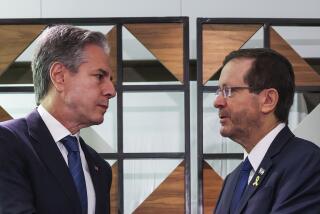Defiant Bosnia Parliament Rejects Foes’ Partition Plan
- Share via
VIENNA — The embattled leadership of Bosnia-Herzegovina on Wednesday rejected its enemies’ terms for peace, stonewalling the latest Western mediation effort and risking another escalation of the Balkans war.
The defiant vote by the Muslim-led Parliament in Sarajevo--cast as an endorsement but strangled by conditions--prompted dire warnings of more death and deprivation as Bosnian civilians head into a second winter under siege.
The vote effectively scraps a peace-for-partitioning deal drafted by Serbian and Croatian nationalists and backed by mediators as the only settlement the international community might be willing to enforce.
Yet even as the Bosnian Parliament weighed the truce that it considers tantamount to surrender, NATO Secretary General Manfred Woerner made clear that Western governments are not ready to send in more troops.
Also, as U.N. officials warned that anarchy would be the likely consequence if the agreement were spurned, clashes were reported in a northwestern region of Bosnia that has declared its intent to break away.
After the convoluted vote on the partition agreement and the declared secession earlier this week of Muslim-held territory around the city of Bihac, the only certainty discernible in Bosnia was that its disintegration is not yet over.
U.N. envoy Thorvald Stoltenberg and Lord Owen of the European Community headed for Geneva, site of the peace talks that produced the partition plan, to “assess the situation,” Stoltenberg’s spokesman, John Mills, said by telephone from the Swiss city.
“It’s very hard to know where to go from here,” Mills said, noting that the proposal was presented to the Sarajevo leadership on a take-it-or-leave-it basis. “The mood here is very somber. We’ve always said the alternative to this settlement is continuing and intensifying conflict. There has to be very real concern for the fate of many thousands of people in Bosnia-Herzegovina going into another winter with the war continuing.”
An estimated 200,000 Bosnians, most of them Muslim civilians, are already dead or missing after 18 months of bloodshed unleashed by a Serbian rebellion that has since deteriorated into a three-sided civil war.
Serbian rebels have conquered 70% of Bosnia and expunged that territory of non-Serbs, and Croatian nationalists have taken more than 20% of Bosnia in the months since it became clear that ethnic partitioning was the only solution under serious consideration at the Geneva talks.
Aid agency officials fear that hundreds of thousands of civilians are at risk of dying during the cold-weather months as many areas of the mountainous republic have been cut off from food, medicine and fuel.
The proposed settlement brokered by Owen and Stoltenberg was described by Bosnian President Alija Izetbegovic as a choice between “just war” and “unjust peace.”
“Territories taken by force, especially where genocide occurred . . . must be returned to their rightful owners. Otherwise, we are living in a jungle. It will be a new Stone Age,” said Bosnian Foreign Minister Haris Silajdzic, in an address to the assembled deputies at the conclusion of their two-day session.
Silajdzic accused Western governments of “complicity” in the attempt to force the Bosnian government’s surrender.
At the Croatian Foreign Ministry in Zagreb, spokeswoman Ivana Moric said that while Croatia would be prepared to return to the bargaining table, it seemed unlikely any more territorial concessions would be made.
Meanwhile, the Croatian press gave prominent play to the decision of Muslim businessman Fikret Abdic to declare the Bihac region and its 300,000 inhabitants the “Autonomous Province of Bosnia.”
U.N. sources said the latest secession drive, pitting Muslims against Muslims, was evidence of Bosnia’s growing chaos and fragmentation. Bosnian Serbs have also clashed among themselves in recent weeks.
There was no immediate reaction to the scuttled truce from the Bosnian Serb stronghold of Pale, just outside of Sarajevo, although rebel leader Radovan Karadzic had warned he would accept only an unconditional surrender.
Bosnian Serb military commander Gen. Ratko Mladic was quoted in Wednesday’s edition of the Belgrade, Yugoslavia, daily Politika as warning North Atlantic Treaty Organization forces that they would not be welcome if they tried to deploy to Bosnia to enforce the accord.
NATO has offered to send in 50,000 peacekeepers--nearly half expected to be U.S. troops--to monitor any settlement approved by all parties. But evidence that the parties are still far from having resolved their disputes has given NATO commanders pause and caused them to state detailed conditions for participation.
In Brussels, Woerner said the alliance would first have to be satisfied that the warring parties were genuinely committed to the settlement terms.
“All those conditions are not yet there, you can’t expect NATO to give a guarantee at this very moment,” he said.
NATO’s hesitation illustrates the conflicting agendas of the alliance and the mediators. NATO nations do not want to be drawn into what amounts to a ground intervention to separate and disarm the combatants. Owen and Stoltenberg feel they are racing the clock to force a settlement and declare the war over before winter.
Western diplomats and U.N. officials concede privately that the latest proposal for ending the war by dividing the republic into ethnic enclaves contradicts the ideals of tolerance, the sanctity of borders and the right of self-defense.
But because the international community has been unwilling to mount a military offensive to roll back nationalist aggression or even to enforce resolutions of the U.N. Security Council, the mediators’ hands have been tied in the quest for a just solution.
“I can understand the Bosnian government’s feeling of betrayal,” one U.N. official said. “There is plenty of scope for shame in European capitals, in capitals around the world.”
Times special correspondents Danica Kirka in Zagreb and Laura Silber in Belgrade contributed to this report.
More to Read
Sign up for Essential California
The most important California stories and recommendations in your inbox every morning.
You may occasionally receive promotional content from the Los Angeles Times.











